Doing business will not be the same after the implementation of the GST. The implications of the game-changing GST legislation are yet to be ascertained in their full complexity in the Indian scenario. How will transactions change? How will supply chains adapt? How will the hitherto ‘unorganised’ sector respond? A panel discussion at the 16th CII Manufacturing Summit 2017, held recently at Taj Vivanta, in Mumbai, had a rich debate on the opportunities and challenges that GST provides, as well as a few lessons for companies from implementation of GST over the next months. The panellists, Seshagiri Rao MVS, Joint Managing Director and Group CEO, JSW Steel; K. Nandakumar, Chairman, CII (WR) Task Force on GST Implementation and Chairman and Managing Director, Chemtrols Industries; Bharat Goenka, Managing Director, Tally Solutions; Rahul Garg, Founder and CEO, Moglix, share their experiences
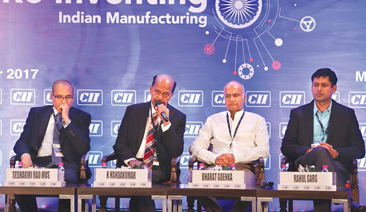
The Goods and Service Tax (GST) is the only act that has such big ramifications across industry, across people and everything. The Confederation of Indian Industry (CII) has worked with the government in formulation and implementation of GST, to a great level. It has been a big challenge because, people always compare introduction of GST to other parts of the world. But, we must understand that in order to bring GST in the largest democracy in the world, the challenges for the government, are quite unimaginable. If you look at the history of GST—it has been there for past 15-20 years and the purpose was of introducing one nation, one single tax. So, it has been a concerted effort by this government to bring in the GST and to ensure that it is implemented by 1st July, 2017.
Even in the 50 years of the CST, there were issues. GST is not just about law, it is also about the way is has to be interpreted in different states and by different tax authorities. Lot of initiatives were taken in formulating such a law, encompassing every aspect of human life, in terms of transactions of goods and services. So, it will have its own implications. Also, at the same time, the desire to change has been the greatest characteristic of this government.
There are lot of issues coming up with GST and in order to address them effectively, it will take time. Also on the part of the authorities and on the part of the industry—to discuss openly— that ecosystem has been very conducive. So, whatever issues that remain or are coming up, they need to be addressed. Over the past 12 months there have been far-reaching implications and regulatory changes, starting with demonetisation, then followed GST, in between there was insolvency and bankruptcy code and related issues, and various states were involved. So, over the last one year there has been regulatory changes, with cascading effects, which has complicated the issues even more. So, now it’s all about addressing those issues on different platforms and we must give the government that much extra time. I am sure, government believes in our desire to implement the GST, because everyone recognises there are benefits of GST—one nation, one tax.
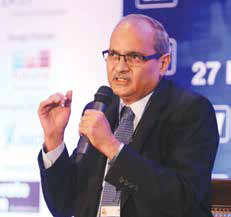 Seshagiri Rao MVS
Seshagiri Rao MVSWhat were the experiences worldwide, when GST was implemented in other countries? There are three points which have come to light—number one, whenever GST was implemented, whether it was dual GST or uniform GST, it had an impact on GDP. Number two, inflation had gone up in several cases. The third, the way business was done, prior to or post-GST, you had to do business differently. Therefore, there will be protests and some inconvenience even prior to implementation of GST. In spite of these painpoints, lot of countries are moving to GST, therefore GST is a very good reform. So, India has done a good thing by implementing the GST.
For instance, everybody talked about the huge problem with registration. What is the threshold of registration— Rs.20 lakh. Looking at pre-GST, for VAT it was Rs.5-10 lakh. If you look at CST, when any interstate sale is done, you have to register with CST and here it is Rs.20 lakh. You look at service tax, it is Rs.10 lakh. Exempting excise duty, in all other cases, the 20 lakh threshold which is for GST, is higher comparatively to other taxes. If somebody is complaining about threshold being the problem, it may be and may not be. With relation to process, there could be some problems, but otherwise threshold is quiet alright relative to what was there pre-GST.
In Returns, there is a huge problem. The Return side—what was in the pre-GST and post-GST? What was the system under VAT? You had to file monthly Returns. CST, you had to file monthly Returns; service tax half-yearly Returns; excise again monthly Returns. So today with GST, if you have to file monthly Returns, there should not be any problem. I don’t think we should be so much complaining about filing the GST Returns.
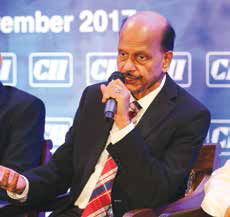 K. Nandakumar
K. NandakumarIn the third area where we look at the Composite Scheme—the one-and-a-half crore limit was there in the excise duty under the Composite Scheme. Initially, it was fixed at 50 lakh, subsequently increased to one crore. Composite Scheme, where-in in excise duty, earlier lot of FSI units, were not subjected to excise duty, today it is not possible for them to opt for Composite Scheme. So, one crore unit—should government look at or not, is one area which we can definitely ask for.
Another point, is inflation getting affected because of GST implementation? Every country has suffered inflation after implementation of GST. Government has been talking about buoyancy in the tax, what does it mean by it? The intention of GST is neutral; neutral rate has to be there.
So, when they are getting more revenue, there is scope for reduction, and the impact of inflation on the common man has to be tackled, therefore rates have to be reduced.
There will be some inconvenience even prior to implementation of GST. In spite of these painpoints, lot of countries are moving to GST, therefore GST is a very good reform
All barriers, multiple taxes, everything has to go, for the free movement of trade and services. If it is so, why e-Way bill? If anything above 50 thousand rupees, you should have an e-Way bill. Anything you are transporting more than 10 kilometres, you need an e-Way bill. Then the validity is, till 100 km it is one day, more than 100 km and every 100 km, add another one day. If you are not able to deliver within that time period, how to revalidate? So, with e-Way bill, you are again bringing in the same problem, of the earlier system of checkpost. So, e-Way bill's necessity has to be debated, whether it is required in the GST scenario, which is again restricting the movement of goods.
Refunds, this is another area where lot of smallscale industries, small-scale players and also exporters are getting impacted. Refunds, I think has to be smoothened. Today, as demand has fallen, GDP is affected because of GST, which is more related to Refund. So, how do we expedite Refund, has to be debated.
Reverse Charge—when the Reverse Charge Mechanism was introduced, there are two areas where Reverse Charge is applicable. One is unregistered dealer—if you are buying from an unregistered dealer, then you are supposed to pay the tax on the bill. Is there any better way of structuring the Reverse Charge, particularly when you are buying from unregistered dealer. So, this Reverse Charge Mechanism is coming in, in obligation to the buyer. If you want to give exemption up to certain level, it is fine. Another point where there can be issue is that any buying of Rs.5,000 and below it, had Reverse Charge—there use to be lot of complications as far as Reverse Charge Mechanism is concerned.
The problems industry has been facing regarding liquidity, e-Way bill and Reverse Charge Mechanism, and any other problem is concerned, need to be addressed. But, I think the way government has responded and is addressing the issues of industry, I am very sure that it will respond very positively to any problems that the industries face.
GST is not just about law, it is also about the way is has to be interpreted in different states and by different tax authorities. Lot of initiatives were taken in formulating such a law

For the last 12 months, I had felt the government was presenting us a slightly stubborn face for every major regulation that it has introduced. At the same time, for the past 45 days, there has been an extremely refreshing change, to see the seriousness with which they want to bring positive change to help the business. Well, the rhetoric before that was, if you are in business you must pay fees, else why are you in business. And, the change of the rhetoric, I think was one of the most important signals in the last 45 days that it is possible for us to look at the future, where we can increase the degree of trust between each other.
If we now start looking at the principle on which GST was constructed, to grammatically simplify the process of taxation, grammatically eliminate the cost of taxation, not just in its compliance cost, but even in terms of its cascading cost —and that, for example, would change the economics, when you look at integrated manufacturing. Because, many of the earlier decisions, on which integrated manufacturing decisions were taken, were also based on the point that you are able to get the tax arbitrage and the economics worked out to be better under certain circumstances and under certain circumstances it would not. Now, if you look at imaginary two-three years from now—imagine that a more perfect GST is in place—I think the way we take decisions will change. The way we will take decisions of locations of our units, the way we will take decisions about whether to do upstream and downstream integration, whether we will look how we want to insource and outsource—all of these decisions will change, as we understand the fact that the tax-cascading impact no longer exists at any level whatsoever.
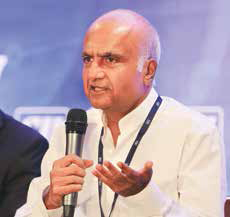 Bharat Goenka
Bharat GoenkaI am making that statement not with pessimism, I am making that statement with apprehension. The apprehension is that despite these days, when it is most crucial for citizens to participate in the formulation of law, as Indians we have got used to the fact that 'what has to happen will happen… what can we do'. So, none of us actually participate in trying to frame the law and trying to represent what needs to be changed. And the people who are making the law, they are not running businesses like you are. They don’t have the experience of what the process should be. They have the right intent, but they don’t have the right knowledge. And if we don’t participate with our knowledge, we ultimately land up or get what we deserve. Which is, you deserve something back, because you are silent about it.
Some of the biggest problems, for example, is tax on advance payments—no goods or services have been exchanged and I don’t know what kind of accounting entry someone can pass, as a one-sided tax entry. And on what basis they will track it and what basis they will reverse it, as they are tax neutral issues. So, the motivation of the government to bring in something versus how do we continue to maintain that end outcome and yet simplify for ourselves and businesses, is a responsibility we owe to ourselves. Ultimately, it’s our future. The future of the country depends upon the future of the industry; it depends on the future of the businessman and if we don’t participate with that aggression, I don’t think we can really look forward to the next two-three years.
The ground principle of GST is extremely powerful; none of us has ever seen the kind of reduction of tax cascading that will happen. Expenses you are getting reimbursed, which many of the people have never ever seen in life, they have only seen in the context of purchase and sales. Many of them are coming to terms with the fact that they can get tax refund, tax input credit, tax that they incur on behalf of the business. It will change the cost of doing business. The simplicity with which you can now record transaction and transparency with which you can record it, and also ensure that you are not ultimately taken for a ride, no matter which part of the country you are dealing with, itself is going to change the way business is being done. If we remove the negatives of GST, we should all look back as being participants in a moment in history, which will never come back to the country. And I hope we all will.
The motivation of the government to bring in something versus how do we continue to maintain that end outcome and yet simplify for ourselves and businesses, is a responsibility we owe to ourselves
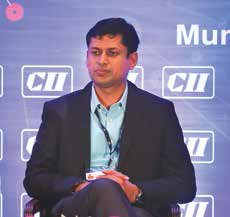 Rahul Garg
Rahul GargOver the last one year, many of you would say that our policy-making and our government is moving very fast and we are not ready for that kind of change. Isn’t that a very optimistic and positive news for us as a country, because for last two decades that I have seen, we were all waiting for the moment our policy framework would start to move fast, to make our nation more competitive, in all directions as possible.
If I were to separate out the macro and strategic aspects of the GST and then the tactical aspects that are around it—my experience as a startup working with manufacturing organisations—in 2015-16 as we expanded across different geographies, had to take a different PAN registration, three excise numbers, three VAT numbers, one service tax. Each of those government organisations were fairly slow, they were different because the Delhi state tax would look different than Harayana, than Maharashtra, than Tamil Nadu. And that was completely ridiculous in my mind, because that goes against the philosophy that if you want to make the country excellent, in terms of Ease of Doing business, in terms of digitisation—these principles had to be changed. So, to me or any organisation that is starting today, he will be lot more hopeful for starting and having a consistent legal and policy framework across the country.
The second implication, which is very important to understand, is that GST is not only a finance change. It is not just the change of percentage point. One, it impacts what is the percentage rate of tax across different commerce sctors. Second thing, it impacts how do I think about supply chain, because this entire tax rate change impacts how I think about my supply chain. Third thing, to make such a change at a scale that the country operates, requires a different level of thinking from a technology infrastructure perspective. I think, that is something we have never been used to, as a country or as businesses, working with each other, because we were used to extremely manual, sort of people-oriented, prone to errors, prone to jugaad, kind of thinking around everything of this function.
Many of you would say that our policy-making and our government is moving very fast and we are not ready for that kind of change. Isn’t that a very optimistic and positive news for us as a country?
We have had many conversations on GST with large organisations, where they would say, I am just going to wait till I know whether the tax is going to be X or Y; I am not even thinking ahead—what do I have to do next. We formulated a Simple-Five rule that every single organisation needs to think about.
You need to think about these five challenges, from day one. You can’t be saying, I will first solve tax rate, then I will think about technology, then I will think about supplier, and then say the government is slow.
By Rajesh Rao